Leadership and Management: Healthcare Trends and Analysis
VerifiedAdded on 2022/12/28
|6
|1326
|86
Essay
AI Summary
This essay delves into the critical differences between leadership and management, with a specific focus on the healthcare industry. It argues for the increasing importance of leadership over traditional management styles. The paper highlights how effective leadership fosters employee growth, influences organizational goals, and strengthens the quality of care, contrasting these aspects with the more administrative functions of management. It explores the core differences in focus, driving forces, approaches to work, and sources of authority between leaders and managers. The essay concludes that healthcare organizations are increasingly recognizing the benefits of leadership in empowering employees, inspiring innovation, and adapting to the changing demands of the healthcare environment. The essay draws on various sources to support its arguments, making a case for the adoption of leadership principles in the management of healthcare organizations.
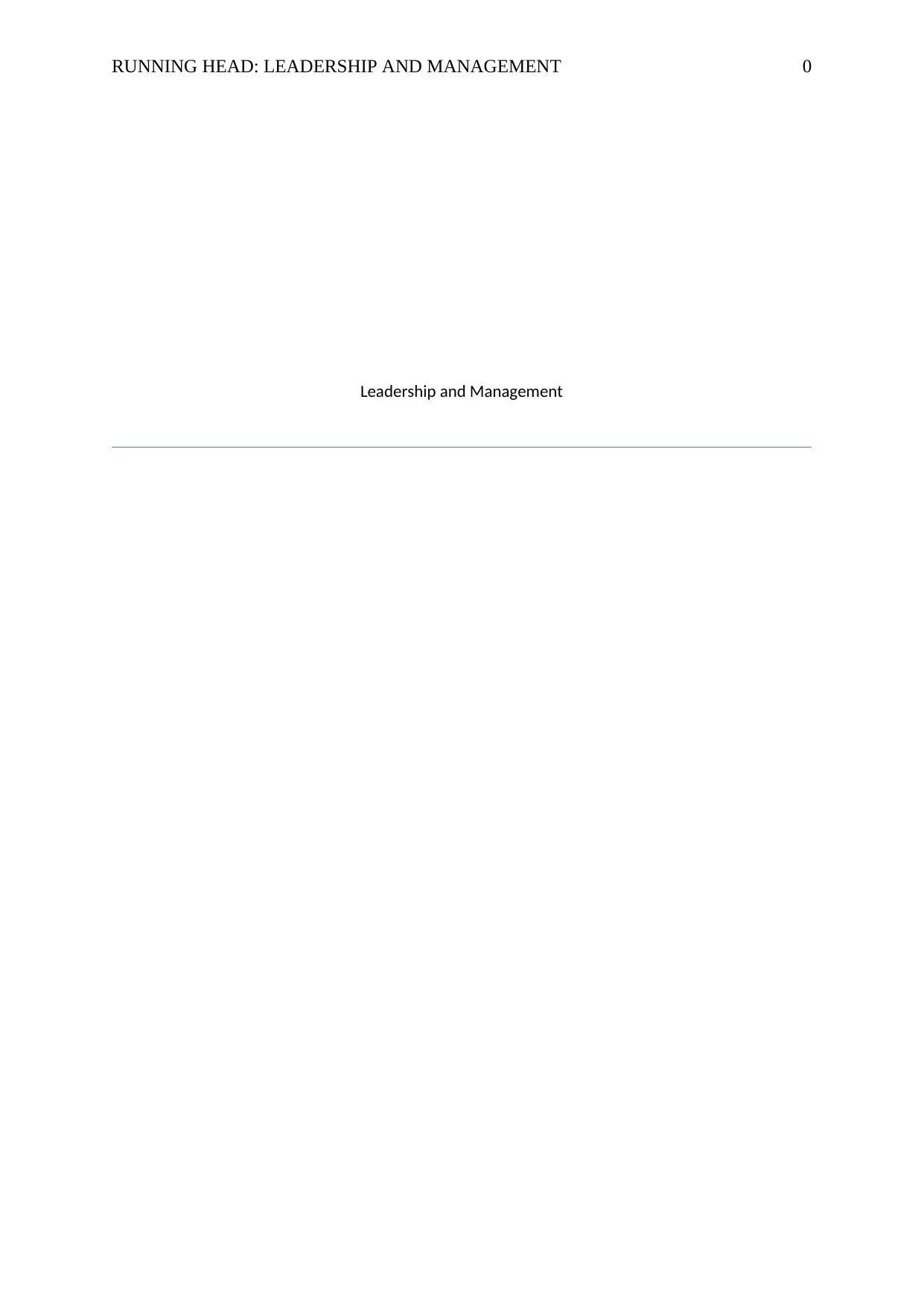
RUNNING HEAD: LEADERSHIP AND MANAGEMENT 0
Leadership and Management
Leadership and Management
Paraphrase This Document
Need a fresh take? Get an instant paraphrase of this document with our AI Paraphraser
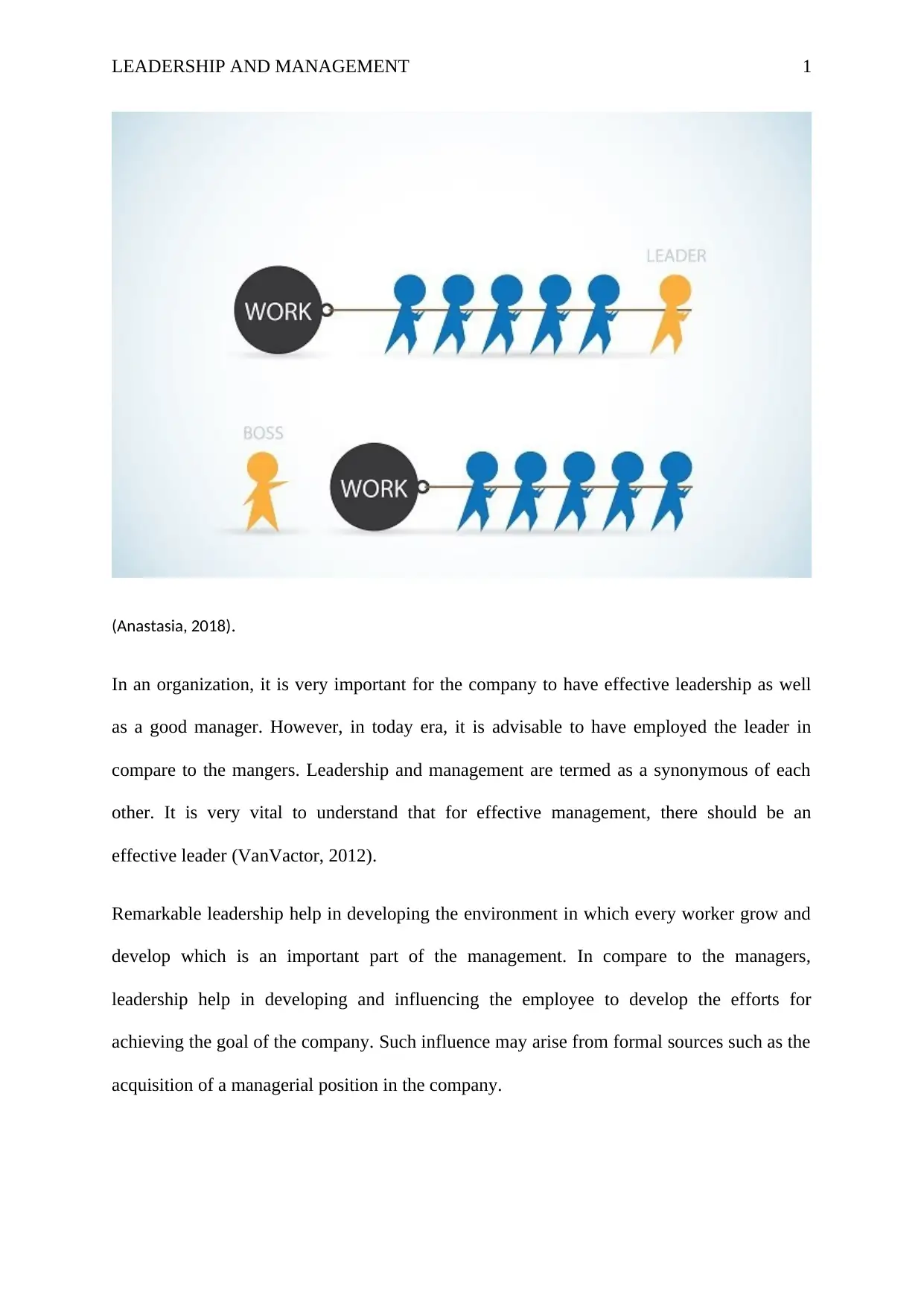
LEADERSHIP AND MANAGEMENT 1
(Anastasia, 2018).
In an organization, it is very important for the company to have effective leadership as well
as a good manager. However, in today era, it is advisable to have employed the leader in
compare to the mangers. Leadership and management are termed as a synonymous of each
other. It is very vital to understand that for effective management, there should be an
effective leader (VanVactor, 2012).
Remarkable leadership help in developing the environment in which every worker grow and
develop which is an important part of the management. In compare to the managers,
leadership help in developing and influencing the employee to develop the efforts for
achieving the goal of the company. Such influence may arise from formal sources such as the
acquisition of a managerial position in the company.
(Anastasia, 2018).
In an organization, it is very important for the company to have effective leadership as well
as a good manager. However, in today era, it is advisable to have employed the leader in
compare to the mangers. Leadership and management are termed as a synonymous of each
other. It is very vital to understand that for effective management, there should be an
effective leader (VanVactor, 2012).
Remarkable leadership help in developing the environment in which every worker grow and
develop which is an important part of the management. In compare to the managers,
leadership help in developing and influencing the employee to develop the efforts for
achieving the goal of the company. Such influence may arise from formal sources such as the
acquisition of a managerial position in the company.
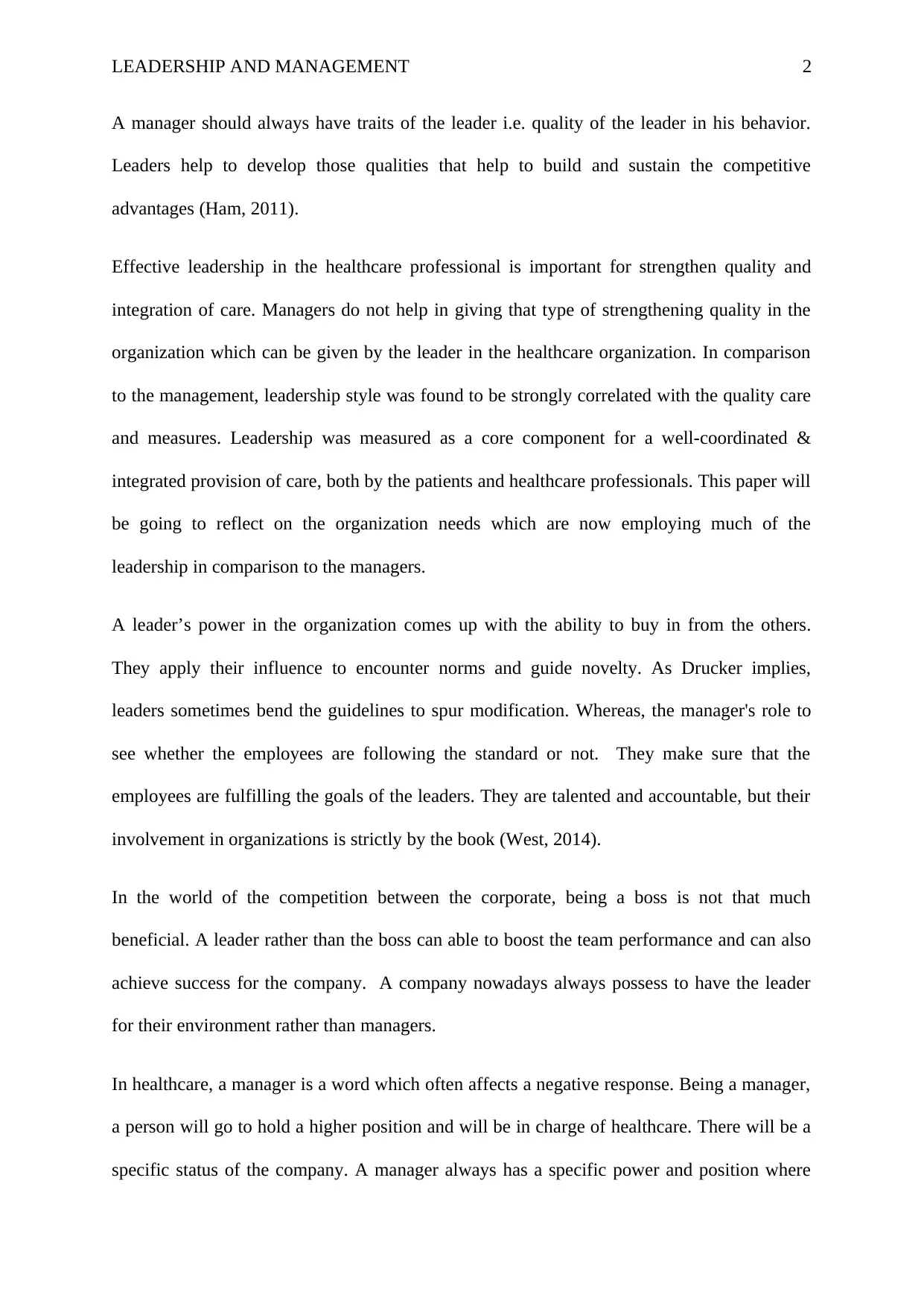
LEADERSHIP AND MANAGEMENT 2
A manager should always have traits of the leader i.e. quality of the leader in his behavior.
Leaders help to develop those qualities that help to build and sustain the competitive
advantages (Ham, 2011).
Effective leadership in the healthcare professional is important for strengthen quality and
integration of care. Managers do not help in giving that type of strengthening quality in the
organization which can be given by the leader in the healthcare organization. In comparison
to the management, leadership style was found to be strongly correlated with the quality care
and measures. Leadership was measured as a core component for a well-coordinated &
integrated provision of care, both by the patients and healthcare professionals. This paper will
be going to reflect on the organization needs which are now employing much of the
leadership in comparison to the managers.
A leader’s power in the organization comes up with the ability to buy in from the others.
They apply their influence to encounter norms and guide novelty. As Drucker implies,
leaders sometimes bend the guidelines to spur modification. Whereas, the manager's role to
see whether the employees are following the standard or not. They make sure that the
employees are fulfilling the goals of the leaders. They are talented and accountable, but their
involvement in organizations is strictly by the book (West, 2014).
In the world of the competition between the corporate, being a boss is not that much
beneficial. A leader rather than the boss can able to boost the team performance and can also
achieve success for the company. A company nowadays always possess to have the leader
for their environment rather than managers.
In healthcare, a manager is a word which often affects a negative response. Being a manager,
a person will go to hold a higher position and will be in charge of healthcare. There will be a
specific status of the company. A manager always has a specific power and position where
A manager should always have traits of the leader i.e. quality of the leader in his behavior.
Leaders help to develop those qualities that help to build and sustain the competitive
advantages (Ham, 2011).
Effective leadership in the healthcare professional is important for strengthen quality and
integration of care. Managers do not help in giving that type of strengthening quality in the
organization which can be given by the leader in the healthcare organization. In comparison
to the management, leadership style was found to be strongly correlated with the quality care
and measures. Leadership was measured as a core component for a well-coordinated &
integrated provision of care, both by the patients and healthcare professionals. This paper will
be going to reflect on the organization needs which are now employing much of the
leadership in comparison to the managers.
A leader’s power in the organization comes up with the ability to buy in from the others.
They apply their influence to encounter norms and guide novelty. As Drucker implies,
leaders sometimes bend the guidelines to spur modification. Whereas, the manager's role to
see whether the employees are following the standard or not. They make sure that the
employees are fulfilling the goals of the leaders. They are talented and accountable, but their
involvement in organizations is strictly by the book (West, 2014).
In the world of the competition between the corporate, being a boss is not that much
beneficial. A leader rather than the boss can able to boost the team performance and can also
achieve success for the company. A company nowadays always possess to have the leader
for their environment rather than managers.
In healthcare, a manager is a word which often affects a negative response. Being a manager,
a person will go to hold a higher position and will be in charge of healthcare. There will be a
specific status of the company. A manager always has a specific power and position where
⊘ This is a preview!⊘
Do you want full access?
Subscribe today to unlock all pages.

Trusted by 1+ million students worldwide
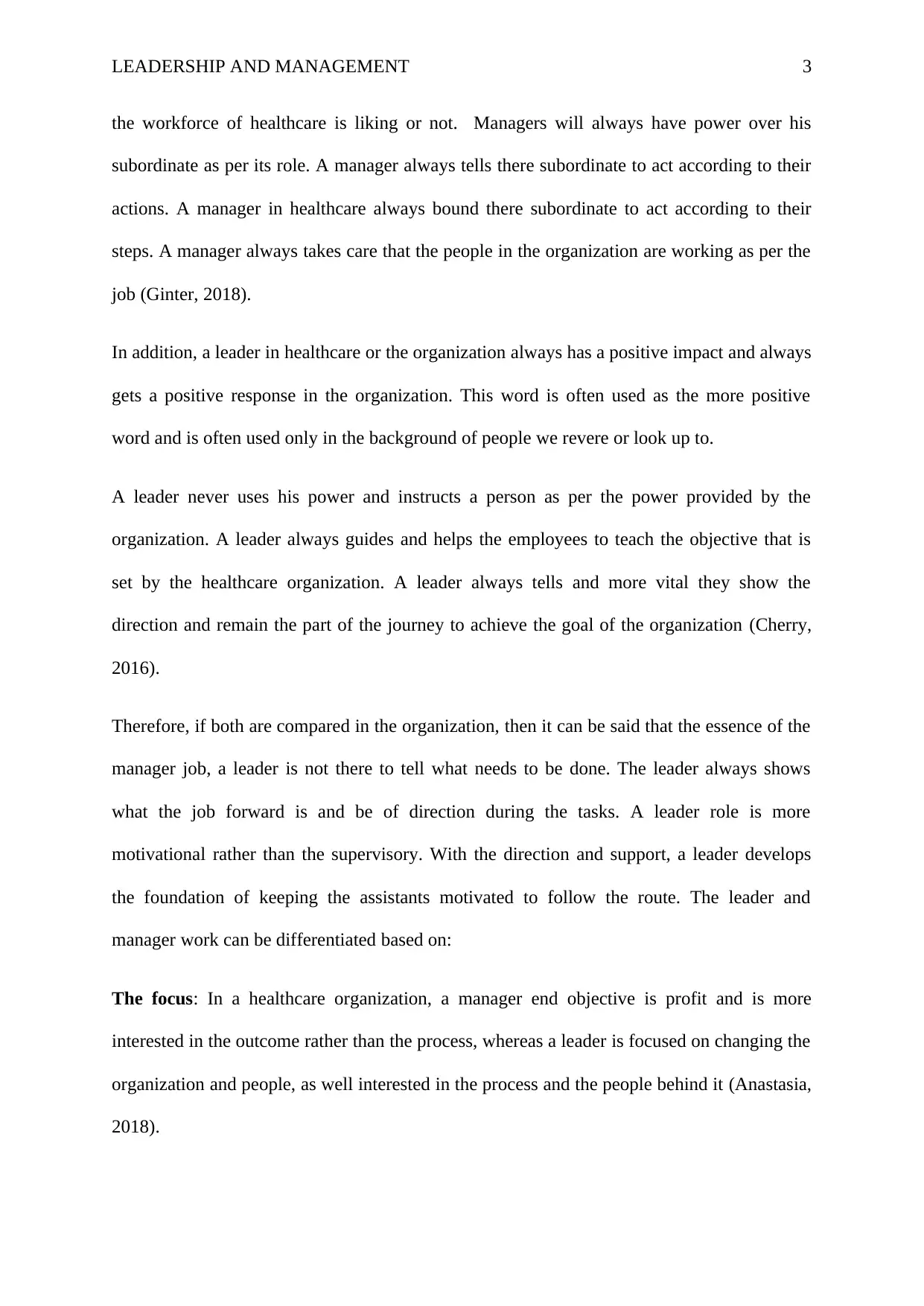
LEADERSHIP AND MANAGEMENT 3
the workforce of healthcare is liking or not. Managers will always have power over his
subordinate as per its role. A manager always tells there subordinate to act according to their
actions. A manager in healthcare always bound there subordinate to act according to their
steps. A manager always takes care that the people in the organization are working as per the
job (Ginter, 2018).
In addition, a leader in healthcare or the organization always has a positive impact and always
gets a positive response in the organization. This word is often used as the more positive
word and is often used only in the background of people we revere or look up to.
A leader never uses his power and instructs a person as per the power provided by the
organization. A leader always guides and helps the employees to teach the objective that is
set by the healthcare organization. A leader always tells and more vital they show the
direction and remain the part of the journey to achieve the goal of the organization (Cherry,
2016).
Therefore, if both are compared in the organization, then it can be said that the essence of the
manager job, a leader is not there to tell what needs to be done. The leader always shows
what the job forward is and be of direction during the tasks. A leader role is more
motivational rather than the supervisory. With the direction and support, a leader develops
the foundation of keeping the assistants motivated to follow the route. The leader and
manager work can be differentiated based on:
The focus: In a healthcare organization, a manager end objective is profit and is more
interested in the outcome rather than the process, whereas a leader is focused on changing the
organization and people, as well interested in the process and the people behind it (Anastasia,
2018).
the workforce of healthcare is liking or not. Managers will always have power over his
subordinate as per its role. A manager always tells there subordinate to act according to their
actions. A manager in healthcare always bound there subordinate to act according to their
steps. A manager always takes care that the people in the organization are working as per the
job (Ginter, 2018).
In addition, a leader in healthcare or the organization always has a positive impact and always
gets a positive response in the organization. This word is often used as the more positive
word and is often used only in the background of people we revere or look up to.
A leader never uses his power and instructs a person as per the power provided by the
organization. A leader always guides and helps the employees to teach the objective that is
set by the healthcare organization. A leader always tells and more vital they show the
direction and remain the part of the journey to achieve the goal of the organization (Cherry,
2016).
Therefore, if both are compared in the organization, then it can be said that the essence of the
manager job, a leader is not there to tell what needs to be done. The leader always shows
what the job forward is and be of direction during the tasks. A leader role is more
motivational rather than the supervisory. With the direction and support, a leader develops
the foundation of keeping the assistants motivated to follow the route. The leader and
manager work can be differentiated based on:
The focus: In a healthcare organization, a manager end objective is profit and is more
interested in the outcome rather than the process, whereas a leader is focused on changing the
organization and people, as well interested in the process and the people behind it (Anastasia,
2018).
Paraphrase This Document
Need a fresh take? Get an instant paraphrase of this document with our AI Paraphraser
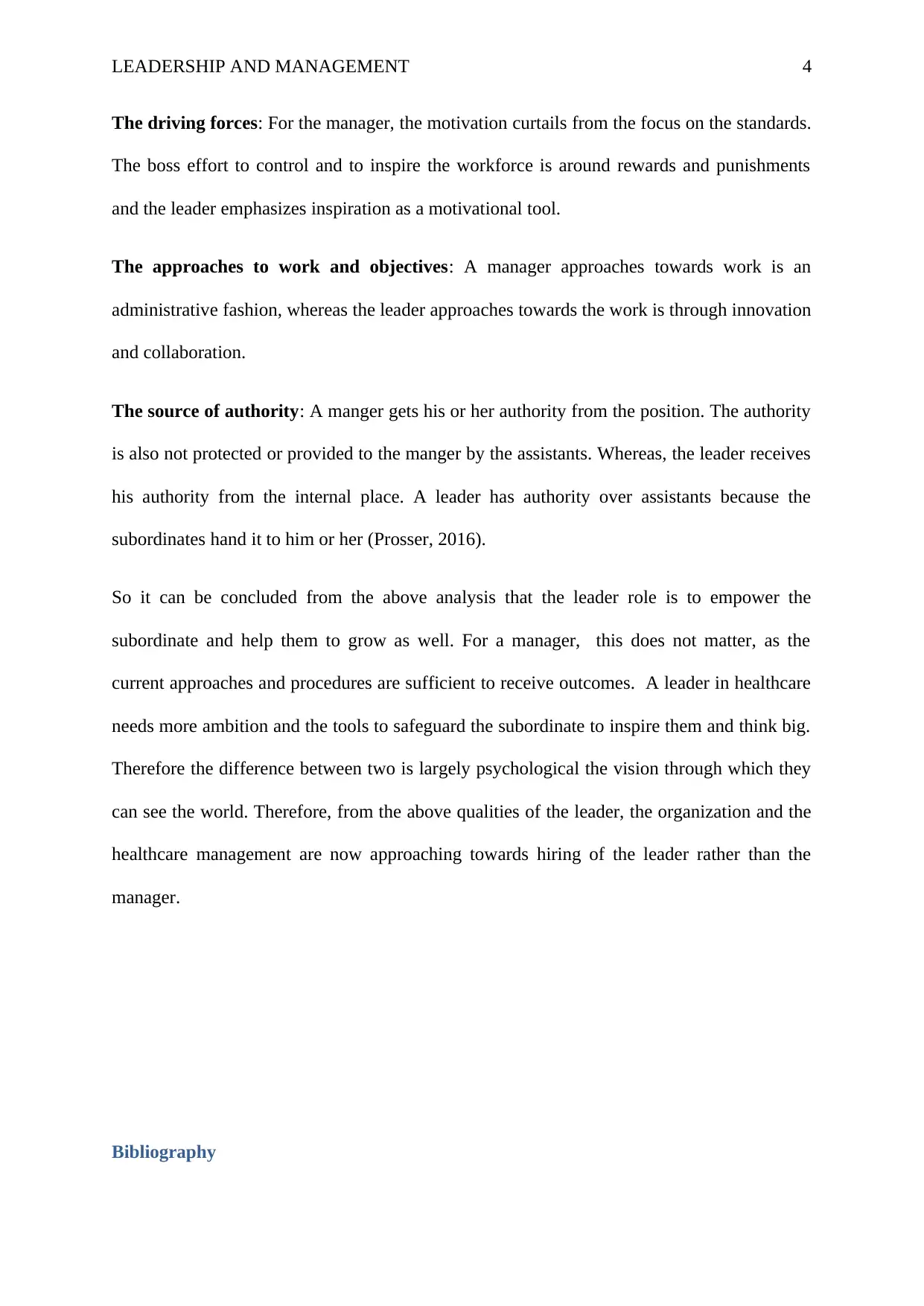
LEADERSHIP AND MANAGEMENT 4
The driving forces: For the manager, the motivation curtails from the focus on the standards.
The boss effort to control and to inspire the workforce is around rewards and punishments
and the leader emphasizes inspiration as a motivational tool.
The approaches to work and objectives: A manager approaches towards work is an
administrative fashion, whereas the leader approaches towards the work is through innovation
and collaboration.
The source of authority: A manger gets his or her authority from the position. The authority
is also not protected or provided to the manger by the assistants. Whereas, the leader receives
his authority from the internal place. A leader has authority over assistants because the
subordinates hand it to him or her (Prosser, 2016).
So it can be concluded from the above analysis that the leader role is to empower the
subordinate and help them to grow as well. For a manager, this does not matter, as the
current approaches and procedures are sufficient to receive outcomes. A leader in healthcare
needs more ambition and the tools to safeguard the subordinate to inspire them and think big.
Therefore the difference between two is largely psychological the vision through which they
can see the world. Therefore, from the above qualities of the leader, the organization and the
healthcare management are now approaching towards hiring of the leader rather than the
manager.
Bibliography
The driving forces: For the manager, the motivation curtails from the focus on the standards.
The boss effort to control and to inspire the workforce is around rewards and punishments
and the leader emphasizes inspiration as a motivational tool.
The approaches to work and objectives: A manager approaches towards work is an
administrative fashion, whereas the leader approaches towards the work is through innovation
and collaboration.
The source of authority: A manger gets his or her authority from the position. The authority
is also not protected or provided to the manger by the assistants. Whereas, the leader receives
his authority from the internal place. A leader has authority over assistants because the
subordinates hand it to him or her (Prosser, 2016).
So it can be concluded from the above analysis that the leader role is to empower the
subordinate and help them to grow as well. For a manager, this does not matter, as the
current approaches and procedures are sufficient to receive outcomes. A leader in healthcare
needs more ambition and the tools to safeguard the subordinate to inspire them and think big.
Therefore the difference between two is largely psychological the vision through which they
can see the world. Therefore, from the above qualities of the leader, the organization and the
healthcare management are now approaching towards hiring of the leader rather than the
manager.
Bibliography
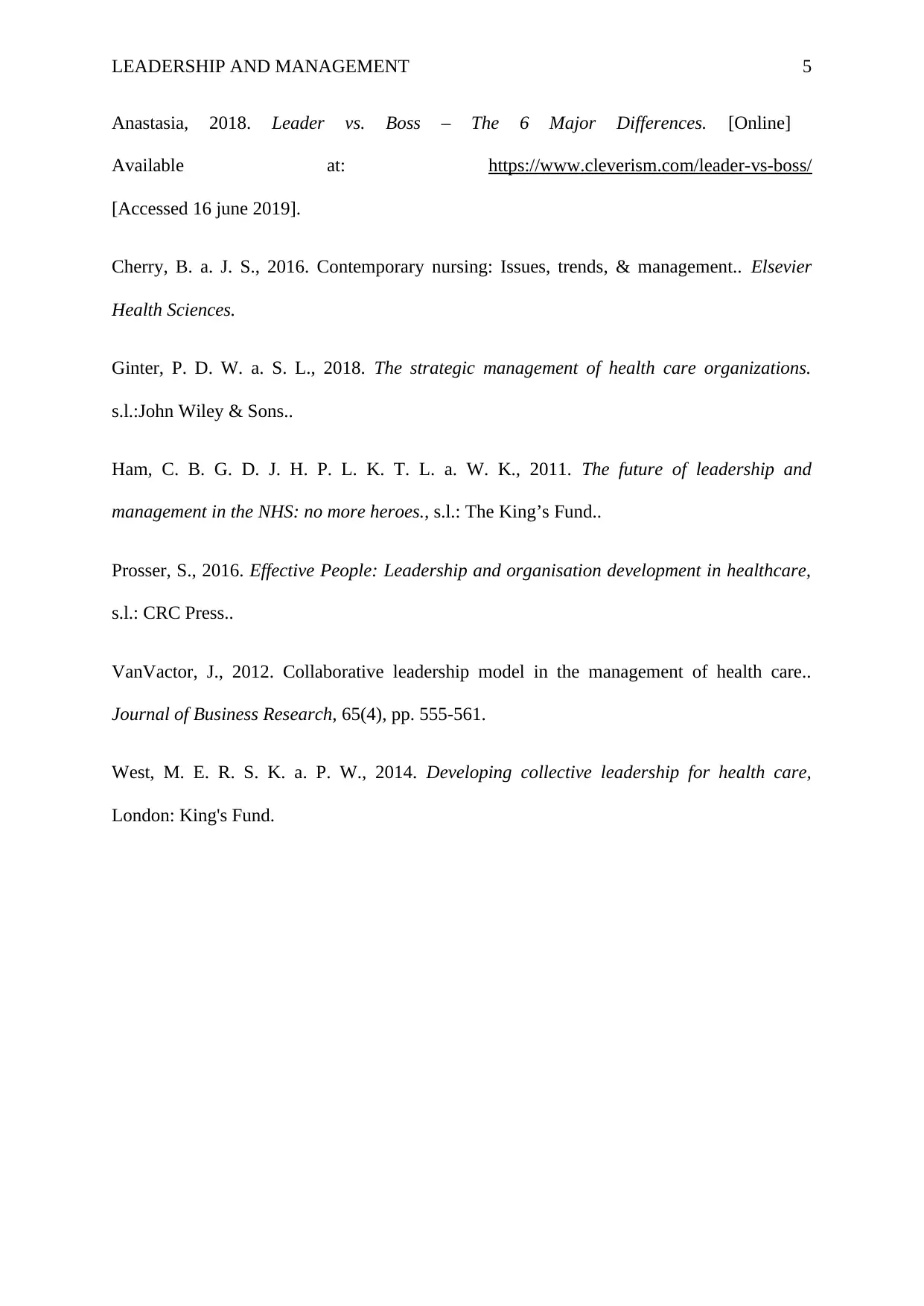
LEADERSHIP AND MANAGEMENT 5
Anastasia, 2018. Leader vs. Boss – The 6 Major Differences. [Online]
Available at: https://www.cleverism.com/leader-vs-boss/
[Accessed 16 june 2019].
Cherry, B. a. J. S., 2016. Contemporary nursing: Issues, trends, & management.. Elsevier
Health Sciences.
Ginter, P. D. W. a. S. L., 2018. The strategic management of health care organizations.
s.l.:John Wiley & Sons..
Ham, C. B. G. D. J. H. P. L. K. T. L. a. W. K., 2011. The future of leadership and
management in the NHS: no more heroes., s.l.: The King’s Fund..
Prosser, S., 2016. Effective People: Leadership and organisation development in healthcare,
s.l.: CRC Press..
VanVactor, J., 2012. Collaborative leadership model in the management of health care..
Journal of Business Research, 65(4), pp. 555-561.
West, M. E. R. S. K. a. P. W., 2014. Developing collective leadership for health care,
London: King's Fund.
Anastasia, 2018. Leader vs. Boss – The 6 Major Differences. [Online]
Available at: https://www.cleverism.com/leader-vs-boss/
[Accessed 16 june 2019].
Cherry, B. a. J. S., 2016. Contemporary nursing: Issues, trends, & management.. Elsevier
Health Sciences.
Ginter, P. D. W. a. S. L., 2018. The strategic management of health care organizations.
s.l.:John Wiley & Sons..
Ham, C. B. G. D. J. H. P. L. K. T. L. a. W. K., 2011. The future of leadership and
management in the NHS: no more heroes., s.l.: The King’s Fund..
Prosser, S., 2016. Effective People: Leadership and organisation development in healthcare,
s.l.: CRC Press..
VanVactor, J., 2012. Collaborative leadership model in the management of health care..
Journal of Business Research, 65(4), pp. 555-561.
West, M. E. R. S. K. a. P. W., 2014. Developing collective leadership for health care,
London: King's Fund.
⊘ This is a preview!⊘
Do you want full access?
Subscribe today to unlock all pages.

Trusted by 1+ million students worldwide
1 out of 6
Related Documents
Your All-in-One AI-Powered Toolkit for Academic Success.
+13062052269
info@desklib.com
Available 24*7 on WhatsApp / Email
![[object Object]](/_next/static/media/star-bottom.7253800d.svg)
Unlock your academic potential
Copyright © 2020–2026 A2Z Services. All Rights Reserved. Developed and managed by ZUCOL.



